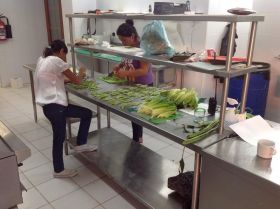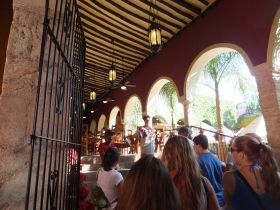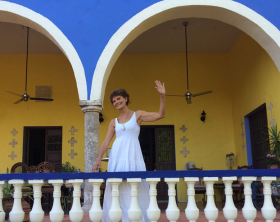How are Americans in Yucatan: Riviera Maya, Playa del Carmen, Cancun, Merida, etc treated? How are expats in Yucatan: Riviera Maya, Playa del Carmen, Cancun, Merida, etc treated generally?
John Venator - Casa de los Venados
 Generally, expats are treated with respect here in Yucatan. The local people are happy to have us here because of people like ourselves who contribute to the community or others like our friend who is a retired teacher and a former Peace Corps volunteer, who she did something much more modest. She bought a piece of property and had construction workers build it and remodeled the little “bodega” that was originally in the property. She has a part-time gardener. Expats are...
Generally, expats are treated with respect here in Yucatan. The local people are happy to have us here because of people like ourselves who contribute to the community or others like our friend who is a retired teacher and a former Peace Corps volunteer, who she did something much more modest. She bought a piece of property and had construction workers build it and remodeled the little “bodega” that was originally in the property. She has a part-time gardener. Expats are... Generally, expats are treated with respect here in Yucatan. The local people are happy to have us here because of people like ourselves who contribute to the community or others like our friend who is a retired teacher and a former Peace Corps volunteer, who she did something much more modest. She bought a piece of property and had construction workers build it and remodeled the little “bodega” that was originally in the property. She has a part-time gardener. Expats are regarded as good for the economy. We are respected and appreciated. The locals like to have us here and we feel very welcome.
Generally, expats are treated with respect here in Yucatan. The local people are happy to have us here because of people like ourselves who contribute to the community or others like our friend who is a retired teacher and a former Peace Corps volunteer, who she did something much more modest. She bought a piece of property and had construction workers build it and remodeled the little “bodega” that was originally in the property. She has a part-time gardener. Expats are regarded as good for the economy. We are respected and appreciated. The locals like to have us here and we feel very welcome. I don’t feel any resentment against Americans or expats in general. However, I am aware of an American expat who is our construction manager during the renovation. When we first started out he said, “We can save a lot of money by just having all the employees not be legal and pay them in cash.”
I told him that I don’t want to do that. We are half a block away from the Zocolo, which is the main town square. Our house is a very big house and I felt like I was wearing an imaginary target on me and I didn’t want to set myself up for a loss, so I wanted to do everything totally legal. I wanted to pay all our employees slightly more and I wanted to pay Social Security and Christmas raises, which it is customary to do for a legal employee. I wanted to give them their vacation and everything that you normally would give a legal employee because guess what, it is still far cheaper than anything that I could ever do in the US.
We are now residente premanentes but we are not dual citizens, which some people choose to do. If you are residente premanentes you are a guest in their country and that applies to any country regardless if it’s Honduras, Panama, or Mexico. You need to be respectful of their traditions, laws, and customs. So I am very aware that we have to do everything correctly. Keeping that in mind, we are welcome, respected and we engaged.
We are now residente premanentes but we are not dual citizens, which some people choose to do. If you are residente premanentes you are a guest in their country and that applies to any country regardless if it’s Honduras, Panama, or Mexico. You need to be respectful of their traditions, laws, and customs. So I am very aware that we have to do everything correctly. Keeping that in mind, we are welcome, respected and we engaged.
(Women preparing the food for an expat's birthday party in Yucatan, Mexico, pictured.)
Posted September 16, 2015
Wade Yarchan - Yucatan Beach Homes
 Americans and other expats in general, are treated well here in Yucatan. It’s fantastic. I lived in Sarasota, Florida, on one of the most affluent streets in all of Sarasota. From there, I would go to some of the less affluent neighboring communities such as Bradenton or Palm Meadow, which had high Latino populations. When I did, I didn’t always feel comfortable leaving my own community when I was in certain areas because I was in an area where I shouldn’t have been.
Americans and other expats in general, are treated well here in Yucatan. It’s fantastic. I lived in Sarasota, Florida, on one of the most affluent streets in all of Sarasota. From there, I would go to some of the less affluent neighboring communities such as Bradenton or Palm Meadow, which had high Latino populations. When I did, I didn’t always feel comfortable leaving my own community when I was in certain areas because I was in an area where I shouldn’t have been....
 Americans and other expats in general, are treated well here in Yucatan. It’s fantastic. I lived in Sarasota, Florida, on one of the most affluent streets in all of Sarasota. From there, I would go to some of the less affluent neighboring communities such as Bradenton or Palm Meadow, which had high Latino populations. When I did, I didn’t always feel comfortable leaving my own community when I was in certain areas because I was in an area where I shouldn’t have been.
Americans and other expats in general, are treated well here in Yucatan. It’s fantastic. I lived in Sarasota, Florida, on one of the most affluent streets in all of Sarasota. From there, I would go to some of the less affluent neighboring communities such as Bradenton or Palm Meadow, which had high Latino populations. When I did, I didn’t always feel comfortable leaving my own community when I was in certain areas because I was in an area where I shouldn’t have been.In contrast, there isn’t a place I have ever gone to here in Merida and in the beaches of Yucatan where I walked in and I felt I shouldn’t be there or that I am not wanted. These people are incredible. I don’t know about the other parts of Mexico and I don’t know about Mexicans in other parts of Mexico, but the people here love life, and people who love life treat other people differently. They operate on a totally different wavelength than we Americans do.
When we first came here, we had this one boy who works for us and I asked him if he listens to the news, or the radio, or the TV, and he said, “No.” So I asked him how he knows what is going on with the world and he answered, “What can I do about it?” That was pretty profound. I had satellite radio on my cars but after three years, I don’t listen to the news very much. Most of the news that I get is on social media, which is as reliable as nothing. Mexico has a totally different lifestyle.
(House open to the beach in Yucatan, Mexico, pictured.)
Posted October 30, 2015
Gary De Spiegelaere - Celestun Properties
 Expats in general are treated with the greatest respect here in Yucatan. The locals will treat you with utmost respect unless you prove yourself not worthy of any respect. Locals here in Celestún, where I live, in a fishing village of 7,500 people with very few expats, they call me “Don Gary.” They don’t call me “Gary”; it’s “Don Gary.” They are very polite and very cordial.
Expats in general are treated with the greatest respect here in Yucatan. The locals will treat you with utmost respect unless you prove yourself not worthy of any respect. Locals here in Celestún, where I live, in a fishing village of 7,500 people with very few expats, they call me “Don Gary.” They don’t call me “Gary”; it’s “Don Gary.” They are very polite and very cordial. Mexicans tend to come into...
 Expats in general are treated with the greatest respect here in Yucatan. The locals will treat you with utmost respect unless you prove yourself not worthy of any respect. Locals here in Celestún, where I live, in a fishing village of 7,500 people with very few expats, they call me “Don Gary.” They don’t call me “Gary”; it’s “Don Gary.” They are very polite and very cordial.
Expats in general are treated with the greatest respect here in Yucatan. The locals will treat you with utmost respect unless you prove yourself not worthy of any respect. Locals here in Celestún, where I live, in a fishing village of 7,500 people with very few expats, they call me “Don Gary.” They don’t call me “Gary”; it’s “Don Gary.” They are very polite and very cordial. Mexicans tend to come into your personal space more than Canadians, but that is their tradition. That is the Latino way. Most Mexicans, even the males, give hugs when they greet you; the same way with the females. But generally, they treat expats with the greatest respect. I don’t feel any resentment at all. I don’t treat them differently if they are poor or not and they don’t treat me differently even if I am a foreigner and I live here.
As an example, in Celestún, there are some extremely wealthy Mexicans. There is one family who lives in Celestún and all their kids drive brand new Mercedes. They own fish plants in town. They own a hotel, restaurants, and yet they are friends with the very poorest people. The class difference is not a big thing in the smaller communities as much as it is in the major centers of Mexico. There are more issues with class in the major centers but here in Celestún, kids go to the same school together, whether they are poor or rich.
(Tourists learn about renovated church in Cancun, Yucatan, Mexico, pictured.)
Posted January 1, 2016
Gustavo Cisneros - Petén
 In general, expats are well respected in Yucatan. The people in the whole Yucatan Peninsula are very nice. The Mayan culture is very open and very nice to people who come from the outside of Yucatan. This culture is very friendly to foreigners.
In general, expats are well respected in Yucatan. The people in the whole Yucatan Peninsula are very nice. The Mayan culture is very open and very nice to people who come from the outside of Yucatan. This culture is very friendly to foreigners.As expat communities develop in certain parts of the Yucatan, they have integrated themselves into the overall society. In Merida (the largest city in the state of Yucatan in the Yucatan Peninsula), as an example, there is an American...
 In general, expats are well respected in Yucatan. The people in the whole Yucatan Peninsula are very nice. The Mayan culture is very open and very nice to people who come from the outside of Yucatan. This culture is very friendly to foreigners.
In general, expats are well respected in Yucatan. The people in the whole Yucatan Peninsula are very nice. The Mayan culture is very open and very nice to people who come from the outside of Yucatan. This culture is very friendly to foreigners.As expat communities develop in certain parts of the Yucatan, they have integrated themselves into the overall society. In Merida (the largest city in the state of Yucatan in the Yucatan Peninsula), as an example, there is an American library. They have integrated themselves into the local activities in the area and they have opened businesses in Merida, too. The expats are trying to actively integrate themselves into the communities. It is no longer unusual for one to see a restaurant or a bar that is being run by an expat.
On the coast, the expats help out in solving the problem with garbage disposal. Some of them teach children English and they are very well received. The locals like them, they are respected, and they are taken care of.
(Poster for a live music and dancing event at the Merida English Library, Merida, Yucatan, Mexico, pictured.)
Posted February 17, 2016
Iona Chamberlin - Hacienda San Pedro Nohpat
 The expats in the state of Yucatan (where Merida is located) are treated exceptionally well by the indigenous people who live in Merida. It doesn’t matter if you’re American, Canadian or European. I don’t think there’s any resentment from the locals towards the expats. People who live outside the walls of my hacienda here in the outskirts of Merida understand their life. They respect each other, and me, but people with resentments carry them wherever they go. ...
The expats in the state of Yucatan (where Merida is located) are treated exceptionally well by the indigenous people who live in Merida. It doesn’t matter if you’re American, Canadian or European. I don’t think there’s any resentment from the locals towards the expats. People who live outside the walls of my hacienda here in the outskirts of Merida understand their life. They respect each other, and me, but people with resentments carry them wherever they go. ... The expats in the state of Yucatan (where Merida is located) are treated exceptionally well by the indigenous people who live in Merida. It doesn’t matter if you’re American, Canadian or European. I don’t think there’s any resentment from the locals towards the expats. People who live outside the walls of my hacienda here in the outskirts of Merida understand their life. They respect each other, and me, but people with resentments carry them wherever they go.
The expats in the state of Yucatan (where Merida is located) are treated exceptionally well by the indigenous people who live in Merida. It doesn’t matter if you’re American, Canadian or European. I don’t think there’s any resentment from the locals towards the expats. People who live outside the walls of my hacienda here in the outskirts of Merida understand their life. They respect each other, and me, but people with resentments carry them wherever they go. I ride the bus with the people of the village. I consider myself a part of this village. I’m friendly with everyone in this village. My husband and I don’t socialize with a lot of people, but I’m friendly with everyone. They’re also friendly in return, and are very helpful.
(Iona Chamberlain welcoming her guests to Hacienda San Pedro Nohpat, Yucatan, Mexico, pictured.)
Posted January 18, 2017


